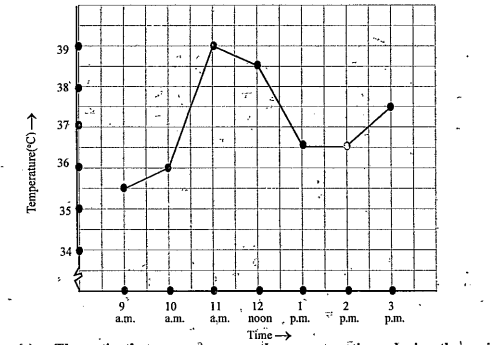Of three consecutive (whole) numbers twice the least exceeds the greatest one by 23. Find the three numbers.Solution in Assamese
Step by step video & image solution for Of three consecutive (whole) numbers twice the least exceeds the greatest one by 23. Find the three numbers. by Maths experts to help you in doubts & scoring excellent marks in Class 8 exams.
Updated on:21/07/2023Topper's Solved these Questions
Similar Questions
The following graph shows the temperature of a natient in a hospital, recorded every hour.
What was the patient's temperature at 1 p.m.?

View SolutionA Square and a rectanglar field with measurements as given in the figure have the same perimeter. Which filed has a larger area?
View Solutionतीन क्रमागत विषम संख्याओ का औसत प्रथम संख्या के एक-तिहाई से 12 अधीक है । तीनो संख्याओ में सबसे अंतिम संख्या ज्ञात करे?
View SolutionThe sum of three consecutive natural numbers is 90. Find the greatest number.
View SolutionIf the square of sum of three positive consecutive natural numbers exceeds the sum of their squares by 292, then what is the largest of the three numbers?
View SolutionThree consecutive natural numbers are such that the square of the middle number exceeds the difference of the squares of the other two by 60. Find the numbers.
View Solutionਤਿੰਨ ਲਗਾਤਾਰ ਸੰਪੂਰਨ ਸੰਖਿਆਵਾਂ ਦਾ ਜੋੜਫਲ 51 ਹੈ। ਸੰਪੂਰਰਨ ਸੰਖਿਆਵਾਂ ਪਤਾ ਕਰੋ।
View SolutionThe product of three numbers in A.P. is 648. If the greatest is twice the least, then determine the numbers.
View SolutionThe sum of the squares of three numbers in A.P. is 116. If the greatest is twice the least, then find the numbers.
View SolutionThe sum of three consecutive numbers is 93. The greatest among these three numbers is
View Solutionतीन क्रमागत पूर्ण संख्याओं में पहली और तीसरी का योगफल 28 है संख्याएँ ज्ञात कीजिए।
View Solutionयदि तीन क्रमागत पूर्ण संख्याओं में मध्य की संख्या 39 हो तो तीनों संख्या ज्ञात कीजिए।
View SolutionThree-fourths of a number exceeds its one-third by 15. Find the number.
View SolutionFind three smallest consecutive whole numbers such that the difference between one - fourth of the largest and one-fifth of the smallest is at least 3.
View SolutionThe sum of three consecutive even natural numbers is 48. Find the greatest of these numbers.
View Solution
